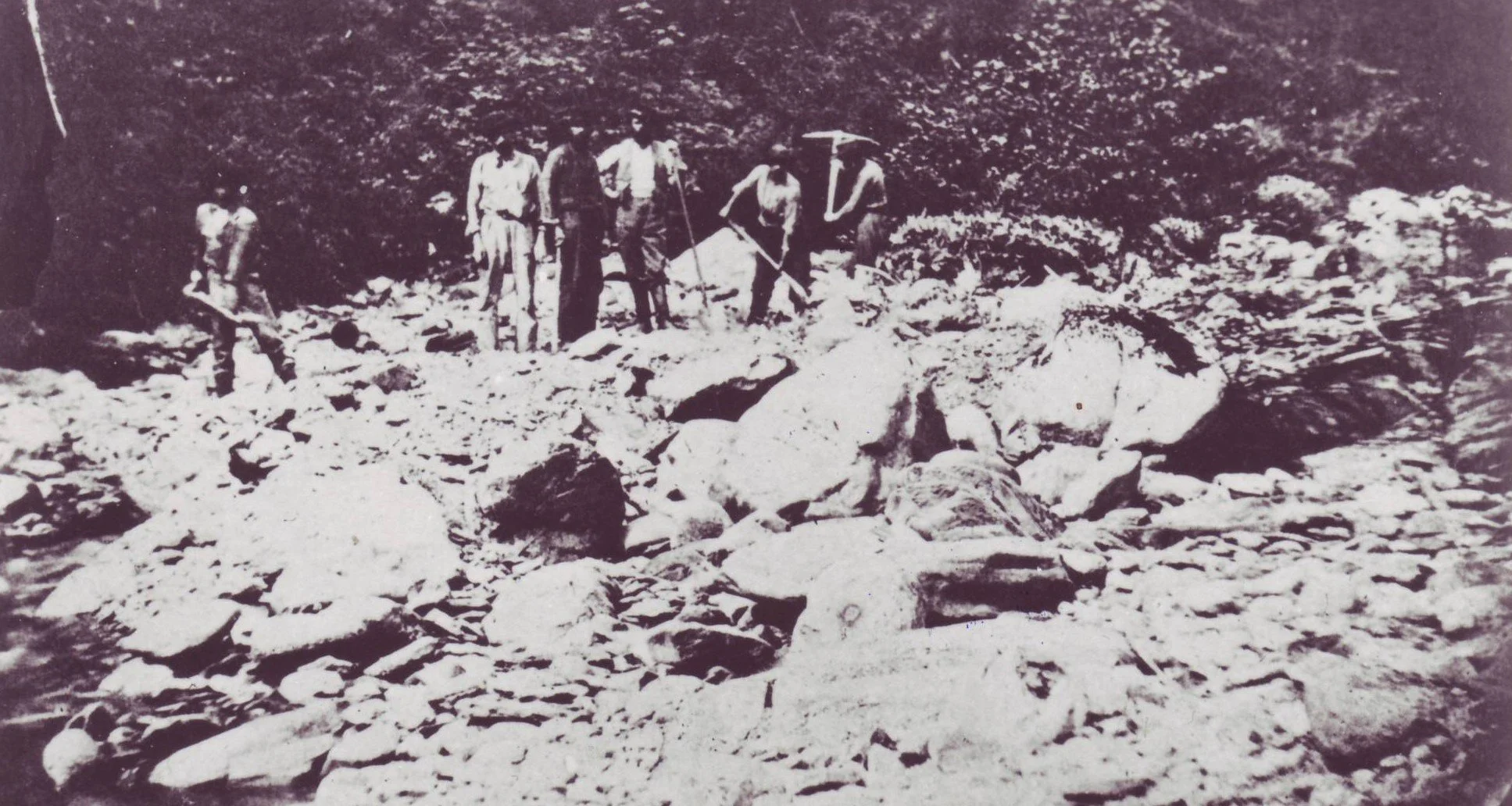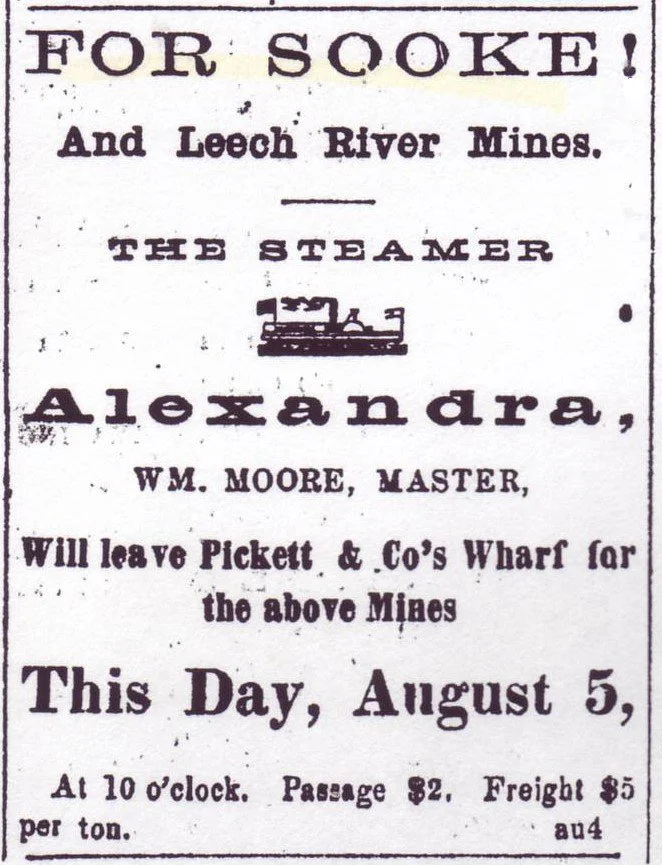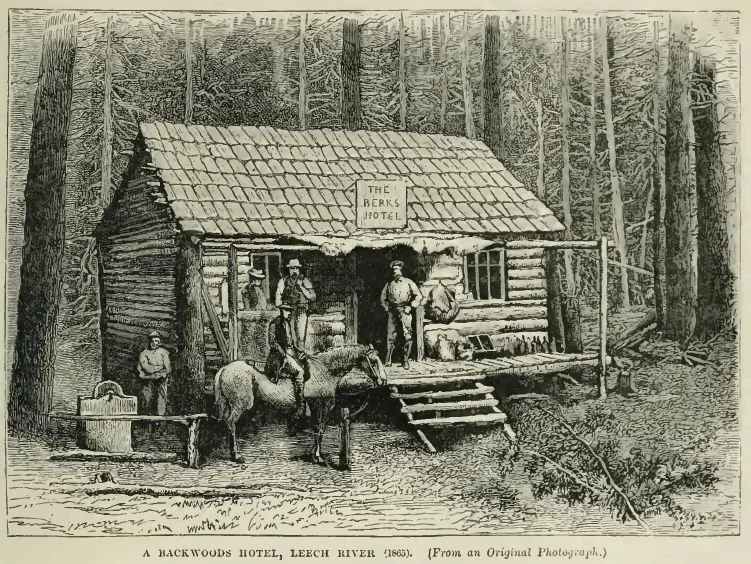Ho! for the Leech River - the Excitement Continues
(Part 4)
As we’ve seen, there were 1000’s of would-be miners in British Columbia in mid-1864; men and women who’d arrived too late to stake rich claims on the Fraser River or in the creeks of Cariboo.
For many Victoria merchants the gold strike on the Leech River was a godsend. George S. Gladwin, as shown in this advertisement in the British Colonist, claimed to be the “first in the field!”.
They had to choose between working for those lucky few who’d struck pay dirt, working the land as settlers—literally from scratch—or going home in abject defeat with no real prospects of a second chance of ever finding a pot of gold. Ahead of them lay only a further lifetime of drudgery without a pension, without even a modest retirement.
A potential gold rush was every bit as important to Victoria merchants. Just eight years before, Victoria had been a small Hudson’s Bay Co. trading post with log stockade and cannon-mounted towers and just a smattering of company employees and independent residents. Almost overnight, upon news of the discovery of gold on the B.C. mainland, a tent city of 30,000 had mushroomed and Victoria boomed.
But, by 1864, the bubble had burst. Many hastily erected ‘downtown’ buildings stood vacant, weeds grew in the streets and Victoria had become just a way station between San Francisco and the Fraser River-Cariboo diggings.
This explains the frenzied response to the Vancouver Island Exploring Expedition’s reports of gold in the Sooke and Leech Rivers—not in the far distant B.C. Interior but, comparatively speaking, almost in Victoria’s backyard. It was the answer to everyone’s prayers!
* * * * *
Gold mining, particularly on the Leech River, wasn’t for the indolent as this barren rockscape identified as the California claim clearly shows. Pans and rockers were used but, it being too late in the season for fluming, some of the best paying deposits were found by crevicing—the difficult job of extracting dust and nuggets from rock fissures, using whatever tools were available, even spoons. —B.C. Archives
(Datelined Aug. 4, 1864)
For those who doubted the richness of the Leech and dismissed it as just a flash in the pan, the Colonist, ever eager to act as cheerleader when it came to promoting local commerce, assured them otherwise. In its August 4th issue following the discovery of a singularly large nugget, this breathless paragraph consists of a single sentence:
“If one nugget had been discovered, and nothing more, there might still be reasonable grounds for doubting the paying capacity of Leech River; but when we find in the same claim, the subsequent prospects realizing from 15 to 16 dollars of course, nuggety gold, during the hour or so the other partners were gone to take out their licenses; and when we learn that from the next claim, from two to three ounces were washed out in as many hours, by the tedious process of panning, we are satisfied that good-paying diggings have been discovered, and we are not prepared to emulate the unbelieving disciple of scriptural celebrity, and refuse to give credence to the news because we have not witnessed the process with their own eyes, nor manipulated the rock with our own hands.
Leech River is a substantial golden reality, and if its wash-dirt is not to be found in large quantities, we suppose the miners will have no objection to taking the gold and much less time out of the slaty rock. There is plenty of rock, if there is not abundance of gravel, and the miner can safely venture to break it up at a depth of even two feet. The river, or we should rather say in mining parlance, creek—for it is both shallow and narrow—can be easily flumed, and the bedrock taken up little difficulty.
That the diggings, so far as the bed of the creek is concerned, must necessarily be of limited duration, no one will be disposed to doubt, but the fact that good prospects can be obtained from benches, many feet above water-level leads us to hope that mining operations will be carried on in the locality for years to come. (The Leech River and its tributaries continue to be worked to this day.—Ed.)
We are merely on the threshold of gold discoveries.
When the enterprising miner has ascended to the source of Leech River and penetrated its forks and tributary—and when the same indefatigable adventurer has prospected the headwaters of San Juan and other streams still further distant, we shall, we feel convinced, have disclosures to publish that will startle the inhabitants of the Pacific coast.
In this connection we may mention that one of the lucky finders of the nugget had some time ago discovered diggings on a tributary of the Alberni River that would pay five cents to the pan—a fact which shows unmistakably that our gold mines bid fair to spread themselves, through time, over the length and breadth of the Island.”
Excursion.—About 100 persons availed themselves of the opportunity of proceeding to Sooke yesterday by the Alexandra, some merely to visit the locality, and others to seek their fortunes on the Leech River diggings. The latter, 55 in number, consisting chiefly of old experienced miners, landed at Thompson's ranch [and] immediately the steamer arrived, shouldered their packs, and started for the diggings.
Expedition.—Some enterprising gentlemen from Victoria have constructed a wharf at Sooke where steamers can now land their passengers and freight. It is 60 feet in length and was completed in the short space of 24 hours.
The Leech River Nugget.— Booth, the possessor of the fine nugget from our new island diggings was offered $90 for the golden egg. Its intrinsic value, without being assayed, is said to be $731/2.
August 5 1864
Despite the encouraging news to date, many would-be prospectors seem to have been reluctant to commit themselves. Their hesitation must have been a boon to those who did hit the ground running:
LATER. From Mr. Wm. Coldwell, who left Leech River yesterday morning at 7 o’clock, we learn that only about 36 men were on Leech River, and they were mostly waiting for provisions and supplies, all appearing to be well satisfied and confident of success.
A number of men are supposed to have gone up the North Fork of the Leech River. About three or four miles of the river on the right bank were staked off. A farmer from [Metchosin] is reported to have struck $4 to the pan above the north fork. Mr. Murray Thain and his party were working two rockers with success.
Donald Bruce was prospecting in the crevices about a mile and a half from the forks of Leech and Sooke rivers, and was doing well. He exhibited some nice specimens of coarse gold that he had taken out.
Messrs. Smith & Moffatt were met packing their provisions up about two hours travel from Leech River. They intended going up the north fork. Mr. Coldwell met a large number of men going up.”
But, already, a darker side common to many gold strikes had manifested itself, the Colonist noting that “Several Chinamen [sic] returned last evening bringing with them a few ounces of gold dust washed out on Leech River. We hear that a disposition has been manifested to oust the Chinamen from these diggings.”
The first prospectors to explore these creeks had been so eager that they’d packed only their tools, with the result that they soon had to return to town. Fortunately for them, although colonial mining law permitted only a 48-hour absence from their leases, Gold Commissioner Golledge granted them 10 days to restock.
Despite the fact that the Leech River had very few operator friendly sandbars and, in fact, resembled a moonscape with its massive ‘undulating’ slate boulders, the first returns continued to be encouraging. Gold pans commonly yielded from $2-$10—good wages.
Miner Rory McDonell, one of the few who had a rocker, had found good prospects on a bench 25 feet above the creek bed, and a claim on the North Fork was yielding up to $3 a pan. Rockers, noted the Colonist, were in high demand and would fetch a good price.
Not everyone dug gold with their hands. Among the businesses that sprang up in what would become known as Leechtown was the “backwoods” Berks Hotel. —Author’s Collection
By now, those at work on the Leech and its tributaries were convinced that the gold had “been washed down from the hills, and that good pay dirt will be found in the old channels, the banks and benches.” This, however, didn’t bode well for a lengthy gold rush: “Unless diggings are discovered in the hills the Leech River will not give employment to more than 600 men, and will soon be worked out.”
Nevertheless, if somewhat slowly, the excitement in Victoria continued to mount.
It was reported that “a good many of the steerage passengers who arrived from Portland by the steamer Oregon were unable to resist the attractive powers of Sooke and disposed of their tickets for whatever they would fetch, in order to venture their fortunes to our Island diggings...
“We are even told of one case in which a married man, who was proceeding with his family to the East and had to pay his passage to San Francisco, became seized with the fever and forfeited his money, hoping to enhance his worldly condition by a visit to our placer diggings...”
Including some of the advertisements, the Colonist pages were filled with references to the “Leech diggings”.
The newspaper joined miners and prospective miners in protesting the $7.50 mining license which had to be bought before they could commence prospecting. It was all very well to make miners contribute to colonial coffers, wrote the editor, but care should be taken lest the authorities, concerned that the diggings would be worked out in just six months, killed the golden goose by discouraging indigent miners with its “cash grab”,
(It should be noted that Richard Golledge, once secretary to former Governor James Douglas, and now Gold Commissioner, was out of his depth. There are reports of miners either ignoring or ridiculing him to his face. Nevertheless, Sooke region’s Golledge Creek commemorates his less than illustrious term as commissioner.)
Complaints aside, the Colonist remained convinced of the Sooke diggings’ rich future: “...In a few weeks a large population will be thronging Leech and other creeks... We have no doubt whatever that before the next few months expire, if we have good mining regulations, the country will be prospected far and wide, and extensive gold fields brought to light.”
(August 8, 1864)
EXCITING REPORT.
_____
$10 to the Pan!
_____
Saturday, August 6th - 1:00 p.m.
Three men, an Italian, a Portuguese and an American, returned on Friday night, having been 13 miles on the Leech River. They report having found a creek extending, so far as we could gather, in a northerly direction from Leech River, in which they prospected finding splendid coarse gold and Nuggets of 50 and 75 cents each.
They sunk six feet through pay dirt, the last pan yielding a prospect of $12, without reaching the bedrock. They returned immediately to Victoria, bringing back with them $50 or $60 of the gold, which they said they had taken out. The country on this creek they describe as open, abounding in elk and other game. The men were very excited over the discovery. They left again this morning with nine men and several hundred dollars of supplies. They intended to flume their claim. The above are the particulars as given by the prospectors. It must however be received with some reservation until confirmed.
ADDITIONAL.
Mr. James Harris left the Forks of Leech River on Friday at 2:00 p.m., and walked through, taking the river trail to the mouth of Sooke River and the [Metchosin] road to Victoria which he reached...after resting nine hours in less than 23 hours. Up to 2:00 p.m., the Gold Commissioner had recorded 150 claims—a great many more were staked off.
Mr. Harris said two others have taken up a claim on the opposite bank to the Industry Co. which prospected well. Mr. Harris showed us some beautiful bright coarse gold about $1.50 or $2 in value, which he washed out in about 20 minutes from the crevices of the slate rock, several feet from the bed of the stream. He also found a pretty little nugget lying in the bed of the stream. They proposed tunnelling into the hill.
All the miners who had claims were elated with their prospects.
The steamer Caledonia returned on Saturday night with about 30 passengers, mostly miners returning for provisions. Their reports all served to confirm the accounts previously received. Those who had taken up claims appeared well satisfied, though as a general rule none had commenced working in real earnest.
Thain, McDonnell & Co. were doing well with their rockers; two of their party working easily part of the time with only one rocker washed out $33 in a day. The benches had been tested and it was ascertained beyond a doubt that they contain gold in paying quantities. prospects varying from 2 to 5 cents to the pan.
(I remind readers that the dollar of 1864 is equal to $19 today. —Ed.)
And so it went, day after day, headline after headline.
* * * * *
As we can see, by all initial indications, the Leech River diggings would prove to be of limited richness and longevity. But for those already on the ground, and for those willing to explore farther afield, the Colonist was convinced that this was but the beginning of years, even decades, of mining prosperity for Vancouver Island.
With the news that one mining company, as the various prospecting groups were called, had dug down almost nine feet and found gold “all the way down,” hopes continued to rise that “millions of dollars will be found in the bed of the river”. Another company that was blessed with a rocker displayed a tin cup containing almost $100 in nuggets obtained at bed-rock.
By this time 205 licenses had been issued and much of the most likely ground staked.
With more miners heading for Leech River Governor Kennedy authorized the preemption of land for Sooke town site and at the site of what was to become Leechtown, the Pioneer Hotel had opened for business, offering meals of venison, elk, bear and trout, with an even more welcome supply of whiskies, wines and liqeurs.




